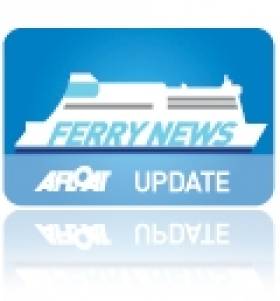Displaying items by tag: New ferry Epsilon
Irish Ferries New Chartered Ferry ‘Epsilon’ on Repositioning Voyage
#NewFerry – Epsilon the new ro-pax ferry which Irish Ferries has secured a three-year charter contract for Irish Sea and French operations, is underway in the Mediterranean Sea on a repositioning voyage bound for Irish waters, writes Jehan Ashmore.
The 2011 built 26,375 tonnes ro-pax ferry is to be introduced firstly on the core Dublin-Holyhead route, boosting capacity as the third vessel in advance of the busy festive season.
In addition to providing daily weekday Irish Sea sailings, from mid-January 2014 she is also to launch a new year-round Dublin-Cherbourg route every weekend, departing the capital on Saturdays and returning on Monday mornings.
Completed by Cantiere Navale Visentini, Italy as Cartour Epsilon, she represents one of more than 20 similar vessels of this ro-pax design which has proven popular in the charter market.
The 500 passenger and crew vessel has been on charter to Caronte & Tourist running between Italian west coast ports and Sicily, from where she departed Messina yesterday and is currently in waters south-west of Sardinia.
Cartour Epsilon is due to call for bunkers in Gibraltar tomorrow night and this route to the UK overseas territory follows that of a sister, Cartour Beta. As AFLOAT.ie reported more than two years ago she sailed off the Algerian coast having departed Palermo and a call to Gibralter before reaching Rosslare Harbour under her new name Celtic Horizon.
The 2006 built Celtic Horizon is also on a three-year charter arrangement from her shipbuilder-owners to Wexford based Celtic Link Ferries which operates to Cherbourg.
When 'Epsilon' enters service this month in the run up to the busy festive period on the core Dublin-Holyhead route, passengers will have economy style facilities on board that include a bar, cafeteria, self-service restaurant, two and four berth cabins and free wi-fi service. In addition the ro-pax will boost vehicle deck space of approximately 2,860 lane metres.
Irish Ferries are to market the Dublin-Cherbourg route to an economy-style service as she differs considerably when compared to cruiseferry style facilities and a broader range of cabins available on board Oscar Wilde.
The new French route will augment the cruiseferry operations of the Oscar Wilde on the Rosslare-Cherbourg route and seasonal only service to Roscoff.





























































